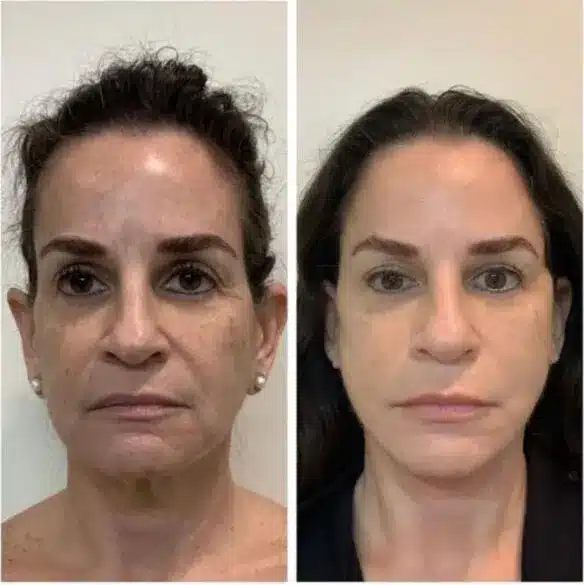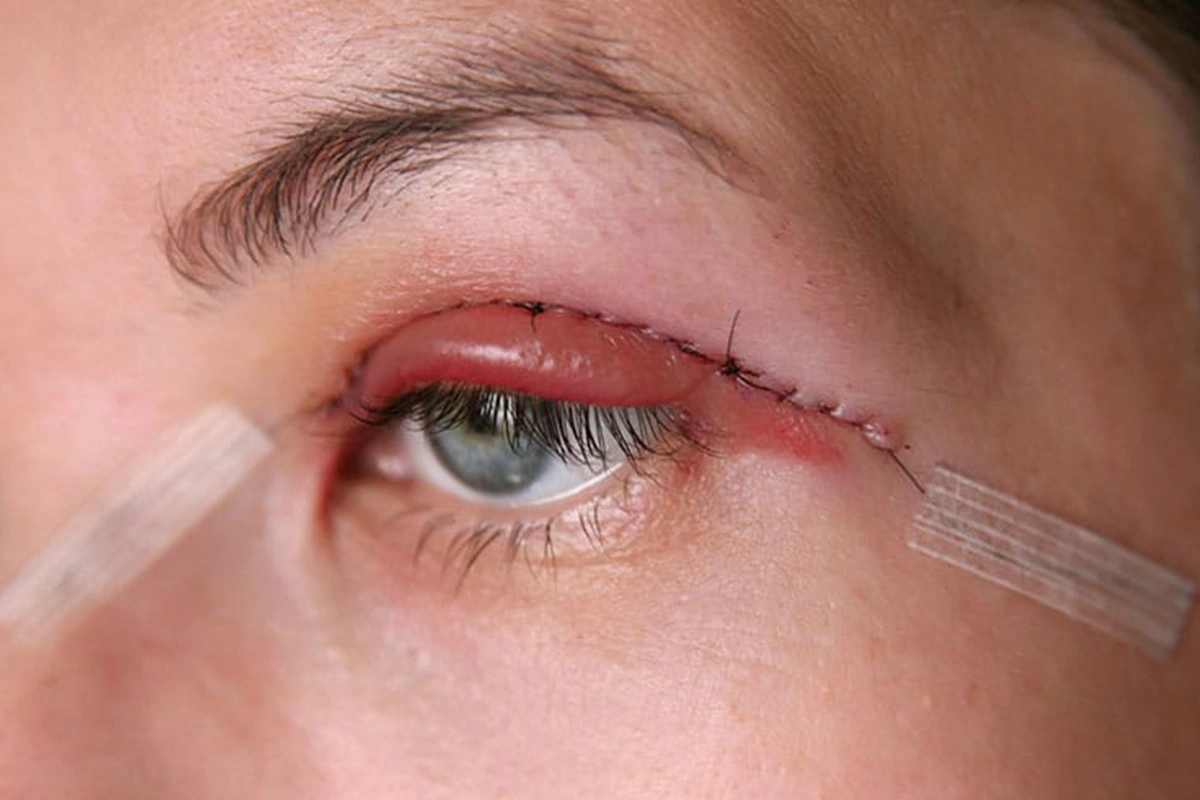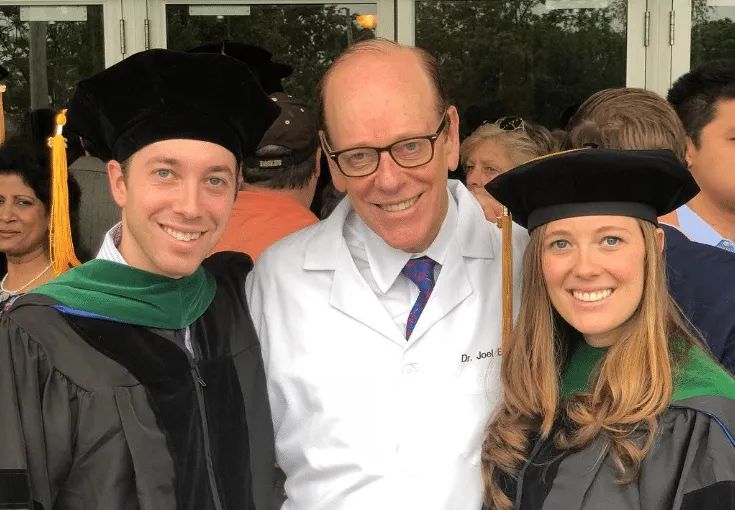Dr. Joel Kopelman is a board-certified plastic surgeon in New York City with decades of experience in facial plastic surgery.
At Kopelman Aesthetic Surgery, he helps patients achieve natural results with minimal discomfort.
If you’re wondering, does face surgery hurt, or does plastic surgery hurt on the face? This guide will walk you through what to expect during and after treatment.
Table of Contents
TogglePain During and After Surgery
How Painful Is Plastic Surgery on the Face?
Most patients describe facial plastic surgery as moderately uncomfortable. The level of pain depends on the surgical procedures performed and your tolerance.
While some soreness or tightness is normal, pain is usually well-controlled with prescription pain medication.
If you’ve been asking yourself, Is plastic surgery painful, the answer is that while discomfort is common, it is temporary and manageable.
Does Facelift Surgery Hurt More Than Others?
Facelift surgeries involve deeper tissue repositioning, which may result in more post-operative tightness.
Still, with modern techniques and proper pain management, discomfort remains manageable. Most patients feel more pressure and swelling than actual sharp pain.
How Much Does Plastic Surgery Hurt After the Procedure?
Pain is most noticeable during the first few days after surgery. You may experience aching or discomfort around the incision site. This usually improves within the first week with medication and rest.
Does Plastic Surgery Hurt a Lot?
No, plastic surgery is not generally described as severely painful. Most patients report mild to moderate discomfort.
The emotional stress of anticipating pain is often worse than the experience. Following aftercare instructions helps minimize pain.
Does Plastic Surgery Hurt the Nose?
Nasal surgeries can cause a sensation of pressure and congestion.
While rhinoplasty involves reshaping delicate structures, pain is usually mild and decreases within a few days. Bruising and swelling around the nose and eyes are more noticeable.
Recovery and Pain Management
How Long Does Pain Last After Surgery?
Pain from facial cosmetic procedures peaks within 48–72 hours and gradually subsides. By the end of the first week, most patients can manage with over-the-counter medications.
Discomfort may persist in areas with more extensive tissue manipulation.
Facelift Recovery Time: Week-by-Week
Week 1: Swelling, bruising, and tightness. Pain is managed with medication. The first week after surgery is when most discomfort occurs.
Week 2: Most bruising fades. You may resume light activities.
Weeks 3–4: Swelling improves. Many patients return to social events.

Week 5+: Final results appear. The remaining swelling is minimal.

Pain Relief: Medications and Home Remedies
Dr. Kopelman prescribes pain medication for initial discomfort. After a few days, most patients switch to non-prescription options.
Most patients take prescription pain medication for 2–3 days before transitioning to over-the-counter pain relievers. Helpful remedies include:
- Cold compresses to reduce swelling
- Elevation of the head during sleep
- Limiting activity near the incision site
Signs of Pain That May Need Medical Help
Pain that worsens, feels sharp, or is accompanied by fever or drainage should be reported. These may indicate complications.
Dr. Kopelman and his team closely monitor post-operative recovery to ensure patient safety.
FAQ: Minimally Invasive vs. Traditional Procedures
Minimally invasive cosmetic procedures, such as thread lifts or fillers, cause less pain and have shorter recovery times. Their results may not be as long-lasting.
Discussing your goals with a board-certified plastic surgeon helps match the right approach.
Comparison Chart: Pain Levels by Surgery Type
Here’s how common facial surgeries compare in terms of pain and recovery:
This comparison enables patients to plan their recovery period with greater confidence.
| Procedure Type | Expected Pain Level (1–10) | Invasiveness Level | Recovery Time |
| Facelift | 5–6 | High | 2–4 weeks |
| Eyelid surgery | 2–3 | Low–Moderate | 1–2 weeks |
| Brow lift | 3–4 | Moderate | 2 weeks |
| Rhinoplasty | 3 | Moderate | 1–3 weeks |
| Non-surgical procedures | 1–2 | Minimal | Few days |
Procedure and Safety
How Is Plastic Surgery Done on the Face?
Facial plastic surgery involves lifting or removing tissue to improve appearance. Techniques depend on the targeted area—face, neck, eyelids, or brow.
Surgery, including incisions, is done with precision to reduce scarring.
What Type of Anesthesia Is Used?
Most facial plastic surgery procedures are performed under general anesthesia. Some more minor surgeries may use local anesthesia with sedation.
Anesthesia ensures you feel no pain during surgery and wake up comfortably.
Is Plastic Surgery Safe?
When performed by an experienced, board-certified plastic surgeon, facial cosmetic surgery is considered a safe procedure.
Dr. Kopelman meets the highest standards of training, ethics, and surgical safety. Risks exist with any surgery, but complications are rare when guidelines are followed.
Risks exist with any surgery, but complications are rare when guidelines are followed.
Does Plastic Surgery Have Side Effects?
Common side effects include swelling, bruising, and numbness near the incision site. These symptoms are temporary. Rare side effects include infection or poor healing. Dr. Kopelman provides detailed aftercare to reduce risks.
Does Plastic Surgery Last Forever?
While plastic surgery can offer long-term improvements, the results are not permanent. Aging continues, and some changes may occur over time.
For example, facelift recovery can last for years, but lifestyle and genetics affect longevity.
Common Concerns and Misconceptions
Why Some Find Plastic Surgery Scary
Concerns often stem from fear of pain or surgical risks. These fears are valid, but modern plastic surgery procedures are designed to be safe and produce natural outcomes. Education and consultation ease anxiety.
Is Plastic Surgery Worth It?
For many patients, yes. If you’re looking for long-lasting improvement, facial plastic surgery can boost confidence.
Dr. Kopelman ensures that each treatment plan is customized to realistic goals and a safe recovery.
If you’re considering a facelift at a younger age, learn what the best age to start is and how age can influence results and recovery.
Understanding the recovery process and working with a skilled surgeon are essential parts of making surgery worthwhile.
Final Thoughts, Your Next Steps
To learn more about your options and get personalized advice, schedule a consultation with Dr. Joel Kopelman today. His experience in facial plastic surgery ensures expert care and natural results tailored to your needs.
Facelift Surgery FAQs
No. Most patients report only mild to moderate discomfort.
Most people return to light activities within 7 to 10 days.
Full facelifts involve the most discomfort due to deeper tissue work, but it remains manageable.
Sudden, severe, or spreading pain—especially with swelling or fever—should be reported to your surgeon.

























